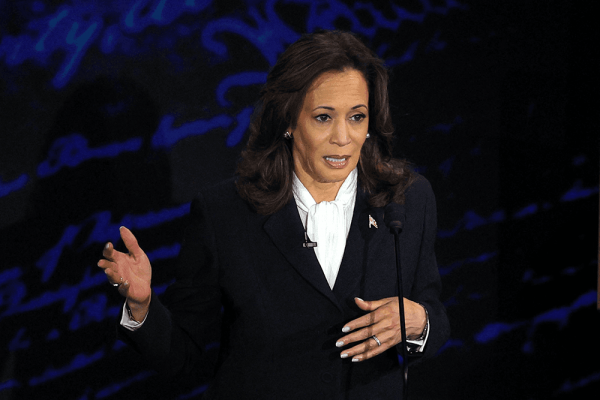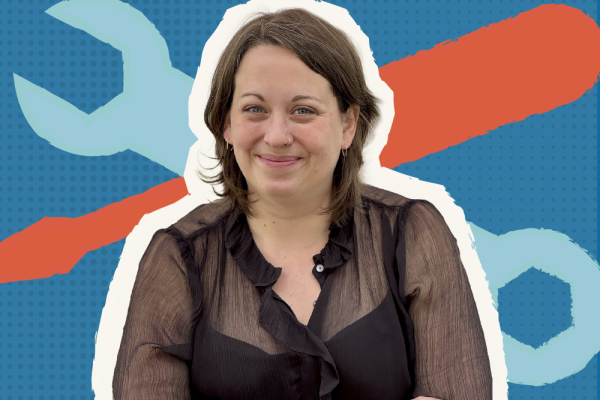As Vice President Kamala Harris and former President Donald Trump discussed abortion policy during their first debate, Harris vigorously defended her vision for federal abortion rights. While she did, she returned to a talking point meant to appeal to religious voters.
“[Under Trump’s abortion bans] a survivor of a crime — a violation to their body — does not have the right to make a decision about what happens to their body next. That is immoral,” Harris said, before connecting morality and faith. “And one does not have to abandon their faith or deeply held beliefs to agree: The government, and Donald Trump certainly, should not be telling a woman what to do with her body.”
This line, that people do not need to “abandon their faith,” has been Harris’ go-to phrase for years as she explains how she sees faith and reproductive rights intersecting.
The logic behind Harris’s statement is at least a century old, said Gillian Frank, assistant professor of history at Trinity College Dublin. It dates back to debates over contraception, when Mainline Protestants, Jews, and some Catholics opposed the position that because life begins at conception, preventing it through any technology interfered with God’s purpose for sexuality.
“The basic argument was that you don’t need civil law to enforce religious ethics,” Frank said.
In the 1920s and ’30s, as challenges mounted to the Comstock Act — a 19th-century law that prevented the transportation of contraception and abortion-related material — the argument took on similar contours to what we see today, Frank said.
Using similar logic to Harris’s position on abortion, advocates argued that making contraception legal — neither mandated nor forbidden — was to render the government properly neutral in a religious debate on family planning. And today, because beliefs about when a zygote or fetus becomes a person are still religious or ethical in nature, those opposed to abortion bans argue that a religious belief still forms the foundation for personhood arguments against abortions.
When Harris argues that voters don’t need to abandon their religious beliefs, she’s touching on these two positions, arguing that it isn’t the government’s place to resolve religious and ethical debates.
Of course, Frank said, since those 19th-centruy debates, some have argued that preventing or ending a pregnancy after conception is tantamount to murder. That logic persists among many pro-life supporters. For these voters, often motivated by a conservative Christian faith, side-stepping personhood debates is unacceptable. But Katey Zeh, CEO of the Religious Coalition for Reproductive Choice, said Harris wouldn’t make much progress with this group regardless.
“There’s no short-term pulling folks away from that bloc,” Zeh said.
Evangelical support
For some pro-life Christians, Trump’s threat to democracy and his own inconsistency on abortion provides an opening to consider the merits of candidates who support abortion rights. Chris Butler, lead pastor of the Chicago Embassy Church Network and leader with AND Campaign, a Christian nonprofit, said the entire conversation on abortion is due for a reset.
“There are too many abortions in this country and that is not purely a religious position,” he said. “I think life starts in the womb and every life is real, precious, and worthy of being protected. That includes the life of the mother.”
While he does support restrictions on abortion, he said, the issue is far more complex than legal rights or religious freedom arguments can cover. Rather than focusing on rights and restrictions as the “win,” Butler said, there’s more common ground to be found in policies that reduce the need for abortion — like paid family leave, better access to health care, and other social support.
Some evangelicals, traditionally the largest anti-abortion voting bloc, are even moving beyond tepid support for a pro-choice candidate and toward explicit arguments in favor of abortion rights. Historian Joey Cochran first faced backlash for his position on abortion two years ago when he was teaching at Wheaton College, a prominent evangelical institution. When Cochran said that women should be the leading voices on any legislation regarding abortion rights, far-Right activist and self-proclaimed Christian nationalist William Wolfe targeted him as among faculty at religious institutions who Wolfe wanted removed.
But for Cochran, who left for unrelated reasons and now teaches at Purdue University Northwest, that opinion was not theoretical; it was personal. Cochran told Sojourners that his wife, after her fourth cesarean section delivery, had been told by her doctors that she would not survive another pregnancy. She had also survived horrific sexual abuse as a child; she knew not every person gets to control whether they get pregnant. With that context, Cochran said, he firmly believed that decision-making around pregnancy should rest not with lawmakers but with pregnant people and their caregivers.
Cochran said that, traditionally, midwives were the ones to help make pregnancy decisions.
“Women who had seen the birth of many children and knew how to respond. They were entrusted with the decision,” he said. “And now you have legislation that ties the hands of the medical professionals who are entrusted with that care.”
Having an abortion at any stage in the pregnancy, Cochran said, is an ethical and medical decision. When the letter of the law dictates something so complex and personal, it runs afoul of the democratic ideals he teaches in his classes.
“Ethically speaking, the two voters or citizens who are most affected by this legislation are women and medical professionals who are caring for and responsible for the safety of mother and baby,” he said.
In addition to removing the agency from pregnant people, he said, rigid legislation like abortion bans removes the protections doctors need to serve their patients in urgent, life-threatening situations.
Appealing to religious moderates
For those who cannot be convinced even by the life-and-death stakes of abortion bans, there may not be a winning argument. Even so, Ashley Wilson, strategic communications advisor at Catholics for Choice, a reproductive rights advocacy group, said Harris should keep the line. She said it helps represent those Christians, like her, who don’t see a tension between faith and abortion rights.
“Kamala Harris has been out there saying one does not have to abandon their faith or deeply held beliefs to believe that the government should not tell a woman what to do with her body,” said Wilson. “I hear my faith reflected in that.”
Further, Wilson said that the conservative argument against abortion rights is rooted in a theological argument. Wilson and other Christians don’t see their faith as teaching that a nation’s laws should reflect their theological beliefs.
“Our faith teaches the importance of conscience, social justice, religious freedom, and religious pluralism,” Wilson said.
While religious doctrine on abortion has been more rigid, especially during the Roe era, the actual beliefs of religious Americans have proven more diverse. Only 1 in 10 Catholics in a 2022 study from Pew Research Center said abortion should be illegal in all cases with no exceptions. A large majority of Catholics (76 percent) say it should be legal in some cases, and 13 percent say it should be legal in all cases.
Though Gallup polling in the same year found that just under a quarter of Catholics and evangelicals said abortion should be illegal in all circumstances, around 55 percent of each group also thought abortion was morally wrong.
But, advocates point out, those surveys were all conducted before the June 2022 Dobbs decision opened the door to the near-total bans that have been enacted in conservative states over the past two years. Some support could be shifting to Harris, not because more Christians have suddenly become abortion advocates, but because the outcomes of the bans have been so dire. Stories of women nearly dying before they can receive medical care during a miscarriage or stillbirth have demonstrated, Zeh said, the danger of broadly outlawing the procedure.
Even those who oppose abortion wouldn’t want these outcomes, Zeh said, and being against a total ban doesn’t mean being pro-abortion. In fact, abortions increased after Dobbs.
Zeh echoed Butler’s view that Christians who oppose abortion might find ways to reduce the need for elective abortion.
“There are lots of other ways to influence society other than banning abortion,” she said.
Got something to say about what you're reading? We value your feedback!







